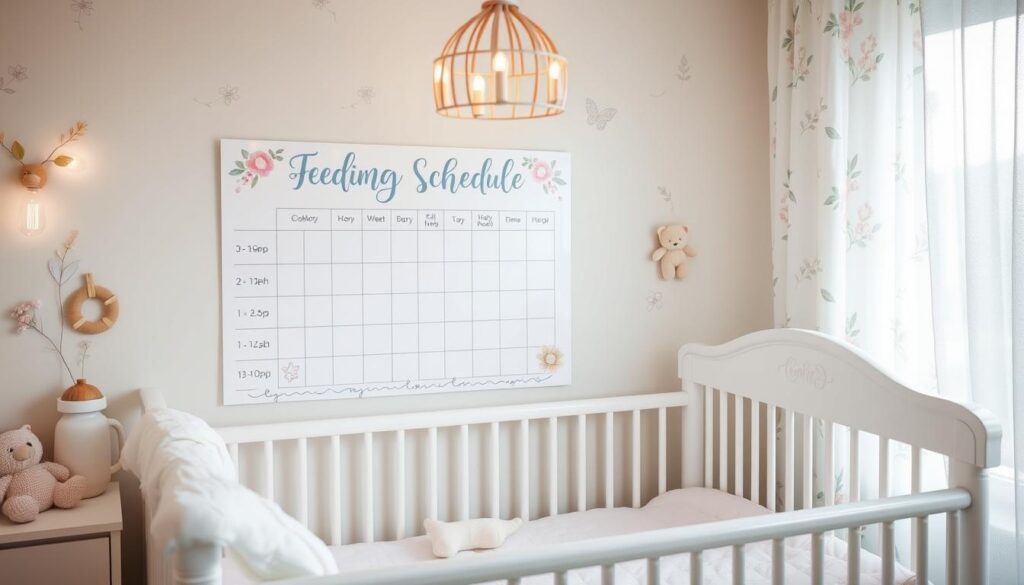Starting your journey as a parent can be exciting but also overwhelming. You might wonder what the most important newborn care tips are. The first month can be tough, but with the right advice, you can handle it well. We’ll guide you through the basics of caring for your newborn in the first month.
We aim to give you the knowledge and skills to excel as a parent. We’ll cover feeding, sleeping, and bonding with your baby. By the end of this guide, you’ll be ready to give your newborn the best care, making the first month a joy.
Key Takeaways
- Understanding the basics of newborn care is key for a smooth start as a parent.
- Feeding and sleeping patterns are vital for your baby’s growth.
- Bonding with your baby is essential for their emotional and physical health.
- Having a support system makes a big difference in the first month.
- Staying informed about newborn care tips helps you face any challenges.
- Don’t forget to take care of yourself for your physical and emotional recovery.
Welcome to Your First Month of Parenthood: What to Expect
Starting this new journey can feel overwhelming. Adjusting to parenthood is a big change. The first month is key, filled with emotions like joy, excitement, fatigue, and uncertainty.
One big challenge is setting up a baby sleep schedule. It’s tough but vital for your baby’s growth and your health. Be ready to adjust to your baby’s unique needs.
Understanding Your New Role
Being a parent means big responsibilities. You’ll focus on your baby’s safety and care. It’s a chance to grow and learn.
Setting Realistic Expectations
It’s important to have realistic goals for yourself and your baby. You won’t have all the answers right away. Making mistakes is part of learning.
Creating a Support System
Having a supportive network is key. Family, friends, and healthcare professionals can help a lot. Asking for help shows strength, not weakness.
By understanding your role, setting realistic goals, and building a support system, you’ll handle parenthood better. Remember, this is just the start of an amazing journey. Take it one step at a time.
Essential Supplies for Your Newborn’s First Month
Getting ready for your newborn’s arrival is exciting. Having the right supplies is key for their first month. A good feeding schedule for newborn helps you and your baby get into a routine. You’ll need diapers, onesies, bottles, and pacifiers.
For feeding, think about the baby food and nursing supplies you’ll need. Breast pumps are great for moms who want to express milk. Choose bottles and nipples that fit your baby’s needs.

A feeding schedule for newborn usually has 8-12 feedings a day. The number and size of feedings change based on the baby’s age and weight. Always check with your pediatrician to make sure the schedule is right for your baby.
- Diapers and wipes
- Onesies and sleepers
- Bottles and nipples
- Pacifiers
- Breast pumps and nursing supplies
With these essential supplies and a feeding schedule for newborn, you’re setting your baby up for success. You’ll create a happy and healthy space for them to grow.
Mastering the Art of Newborn Feeding
Feeding your newborn can be tough but very rewarding. As you recover after giving birth, finding a feeding routine that suits you and your baby is key. This routine is vital for your baby’s health and helps you bond.
During feeding, you can bond with your baby through touch and eye contact. This special time strengthens your connection. It makes feeding more enjoyable for both of you.
Breastfeeding Basics
Breastfeeding is a natural way to feed your baby. It gives them essential nutrients and antibodies. You’ll need the right supplies, like a nursing pillow and breast pads, to start.
Establishing Feeding Patterns
Creating a feeding pattern helps you and your baby get into a routine. This makes managing postpartum recovery and bonding with baby easier. A typical schedule includes:
- 8-12 feedings in 24 hours for breastfed babies
- 6-8 feedings in 24 hours for formula-fed babies

Common Feeding Challenges
Feeding challenges like latching issues, sore nipples, and engorgement can happen. If you face these, get help from a lactation consultant or healthcare professional. With patience and support, you can overcome these and keep feeding your baby. This strengthens your bonding with baby during postpartum recovery.
| Feeding Challenge | Solution |
|---|---|
| Latching issues | Seek help from a lactation consultant |
| Nipple soreness | Use nipple cream and take regular breaks |
| Engorgement | Use cold compresses and express milk regularly |
Creating a Safe Sleep Environment
As a new parent, making sure your newborn is safe is very important. One key thing is to create a safe sleep area. You can do this by picking the right crib and mattress that meet safety standards.
Some important things to think about for a safe sleep area include:
- Placing your baby on their back to sleep, as this reduces the risk of Sudden Infant Death Syndrome (SIDS)
- Using a firm, flat mattress and a tight-fitting sheet
- Keeping the sleep area free from soft objects, toys, and loose bedding
By following these tips, you can help keep your baby safe while they sleep. This helps them grow in a healthy and happy way. 
Creating a safe sleep area is just one part of keeping your newborn healthy. Being aware of health concerns and taking steps to prevent them is also important. This way, your baby can grow and develop in a safe and happy environment.
| Safety Tip | Description |
|---|---|
| Check the crib | Ensure the crib meets current safety standards and has no recalls |
| Use a firm mattress | Choose a mattress that is firm and flat, and fits snugly in the crib |
| Keep it clear | Keep the sleep area free from soft objects, toys, and loose bedding |
Daily Care Routines for Your Newborn
As a new parent, setting up daily care routines is key. It keeps you organized and ensures your newborn stays healthy. With the right parenting advice and newborn care tips, you can find a routine that fits you and your baby. Diapering and hygiene are critical parts of daily care.
Choosing the right diapers and wipes is important for your baby’s comfort and health. For bathing, you’ll need gentle cleanser and a soft towel. A baby bathtub or sink insert can make bath time safer and more fun.
Dressing your baby for comfort is also vital. It helps keep their body temperature right and prevents overheating. Dressing in layers is a good idea, so you can adjust clothes as needed.

- Change your baby’s diaper often to avoid diaper rash and skin irritation
- Use a gentle cleanser and lukewarm water when bathing your baby
- Dress your baby in comfortable, breathable clothing
- Consider using a baby carrier or sling for skin-to-skin contact and convenience
By following these parenting advice and newborn care tips, you can create a daily care routine that meets your baby’s unique needs. This promotes a healthy, happy start in life.
| Daily Care Activity | Frequency | Tips |
|---|---|---|
| Diapering | Every 2-3 hours | Choose the right diapers and wipes |
| Bathing | 2-3 times a week | Use gentle cleanser and lukewarm water |
| Dressing | As needed | Dress in layers for temperature regulation |
Understanding Your Baby’s Cues and Communication
As you start your journey as a parent, it’s key to know your baby’s signals. Recognizing their needs helps build a strong bond and keeps them happy and healthy. One big challenge is finding a baby sleep schedule that suits everyone.
Listen to your baby’s cries, coos, and body language. By responding to these signs, you make your baby feel safe and build trust. Here are some tips to understand your baby’s language:
- Notice the different cries, as each might mean something like hunger or tiredness.
- Look for body language like stretching or yawning, which means your baby is sleepy.
- Start a bedtime routine with calm activities, like reading or singing, to help your baby relax.
By following these tips and paying attention to your baby’s signals, you can create a baby sleep schedule that suits your family. Remember, becoming a parent is a journey, and it’s okay to take it one step at a time.

“The most important thing is to trust your instincts and respond to your baby’s needs. With time and practice, you’ll become more attuned to their cues and develop a sense of what works best for your family.”
| Age | Sleep Schedule | Tips |
|---|---|---|
| 0-3 months | 16-20 hours of sleep per day | Establish a bedtime routine and watch for sleepy cues |
| 4-6 months | 14-17 hours of sleep per day | Gradually introduce a consistent sleep schedule and create a sleep-friendly environment |
| 7-9 months | 12-15 hours of sleep per day | Continue to reinforce a consistent sleep schedule and encourage self-soothing techniques |
Managing Your Physical and Emotional Recovery
As you enter the postpartum period, taking care of yourself is key. This time is full of change, and looking after your health is vital. It helps you care for your newborn better.
Recovery is not just about physical healing. It’s also about bonding with your baby. This bond is essential for your baby’s growth. It can be strengthened through skin-to-skin contact, breastfeeding, and play.
Some important parts of postpartum recovery and bonding include:
- Physical healing: letting your body recover from childbirth
- Emotional support: getting help from loved ones, support groups, or mental health experts
- Bonding activities: doing skin-to-skin contact, breastfeeding, and playing together
By focusing on these areas, you’ll be on the path to a successful recovery. You’ll also have a strong, loving bond with your baby.
| Aspect of Postpartum Recovery | Importance |
|---|---|
| Physical Healing | Allows your body to recover from childbirth |
| Emotional Support | Helps you cope with the emotional challenges of parenthood |
| Bonding Activities | Fosters a strong emotional connection with your baby |
Recognizing Common Health Concerns
As a new parent, you might worry about your baby’s health. It’s normal to feel this way. Knowing about common health issues can help you feel more confident. Issues like fever, vomiting, or diarrhea are common.
It’s important to know when to call the doctor. If your baby has trouble breathing, seems very tired, or won’t eat, get help right away. But, a mild rash or a runny nose might not be a big worry.
Normal vs. Concerning Symptoms
To figure out if your baby’s symptoms are normal or not, think about these points:
- Fever: a temperature above 100.4°F (38°C) is a concern
- Vomiting: if your baby vomits more than once or shows signs of dehydration
- Diarrhea: if your baby has more than three loose stools in a row or shows signs of dehydration
Knowing about these health concerns and when to get help can help your baby get the best care. Always be cautious with your baby’s health. Talking to your pediatrician can give you peace of mind.

Stay informed and reach out to your healthcare provider if you’re worried about your baby’s health. With the right advice and support, you can handle newborn health concerns well. This way, you can give your baby a great start in life.
| Symptom | Normal | Concerning |
|---|---|---|
| Fever | Mild, below 100.4°F (38°C) | Above 100.4°F (38°C) |
| Vomiting | Occasional, less than three times | Frequent, more than three times |
| Diarrhea | Mild, less than three loose stools | Severe, more than three loose stools |
Building Strong Bonds with Your Newborn
As you start your journey as a parent, focusing on bonding with your baby is key. This early time is vital for their emotional and mental growth. With the right tips, you can start a lifelong connection with your child.
You’ll learn to meet your baby’s needs, building trust and security. This foundation will support them for years to come.
One great way to bond is through skin-to-skin contact. Hold your baby against your chest to share warmth and heartbeat. Studies show it’s good for their development, helping with temperature, heart rate, and breathing.
Interactive Activities
Doing things together also strengthens your bond. Try reading, singing, and talking to your baby. Also, respond to their sounds and movements. This way, you get to know their personality and needs better.

Remember, bonding takes time and effort. Focus on skin-to-skin contact, interactive play, and being responsive. These steps will help you create a strong bond with your child. With the right care and commitment, your child will grow and thrive.
Adjusting to Your New Family Dynamic
Starting your journey as a parent can be tough but fulfilling. One big step is setting up a baby sleep schedule that fits everyone. This helps bring order and stability to your new family life.
To make a good baby sleep schedule, try these tips:
- Start a bedtime routine with calm activities like reading or singing
- Make sure the room is dark and quiet for better sleep
- Look for signs your baby is tired, like yawning or rubbing their eyes
Looking after yourself is key to smoothly adjusting to parenthood. Be patient and flexible, as every baby is different. They might need a special way to sleep and schedule.
Keep going on your parenting path, knowing it’s okay to ask for help. With time, you’ll find a routine that suits you and your baby. You’ll become more confident and comfortable in your role as a parent.
| Age | Sleep Schedule |
|---|---|
| Newborn (0-3 months) | 16-20 hours of sleep per day, divided into 2-4 hour increments |
| Infant (4-11 months) | 12-15 hours of sleep per day, divided into 1-3 hour increments |
Conclusion: Embracing Your Journey Through Early Parenthood
As you finish this newborn survival guide, take a moment to think about your journey. Becoming a parent is a big change, full of ups and downs. The first few months are key. Make sure to focus on your postpartum recovery, bond with your baby, and get parenting advice when you need it.
It’s important to take care of yourself during this time. Find time for activities that relax you, lean on your loved ones, and ask for help from doctors if needed. Enjoy the special moments with your baby, feeling amazed by their growth and the happiness they bring.
Early parenthood has its challenges, but you can handle them. Be patient, flexible, and open to learning. You’ll find the joy of raising a child is worth it. Remember, you’re not alone. Many parents have been where you are, and many will follow.
